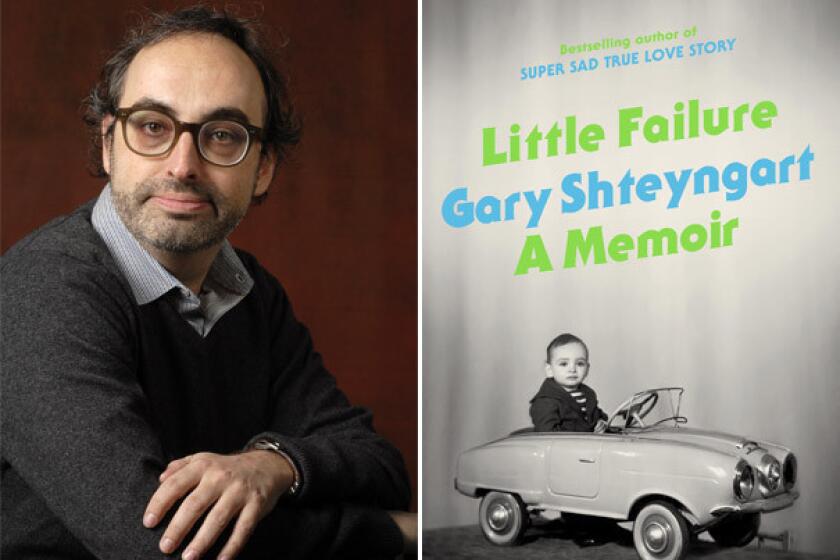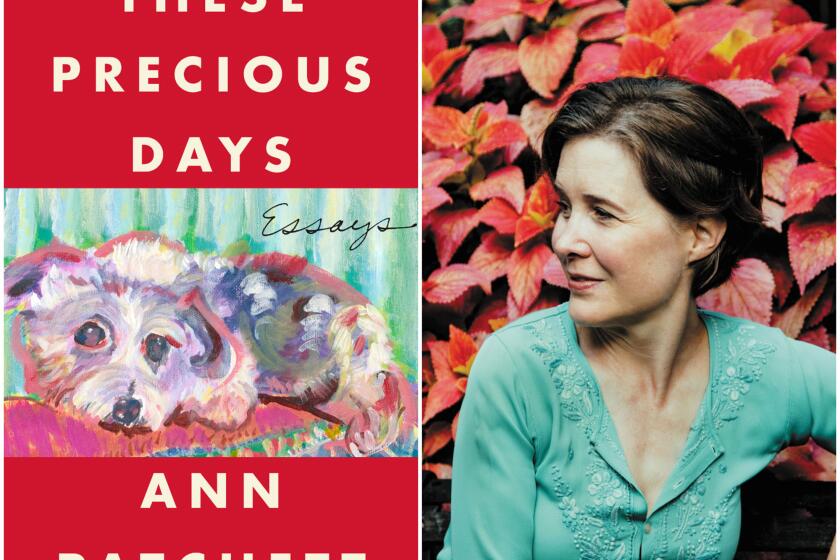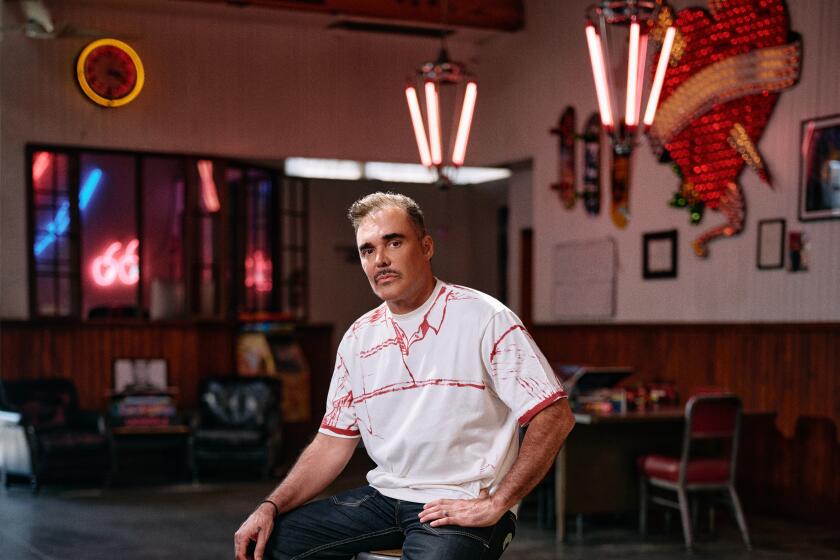Gary Shteyngart’s cozy, dystopian, soap-operatic immigrant COVID paradise
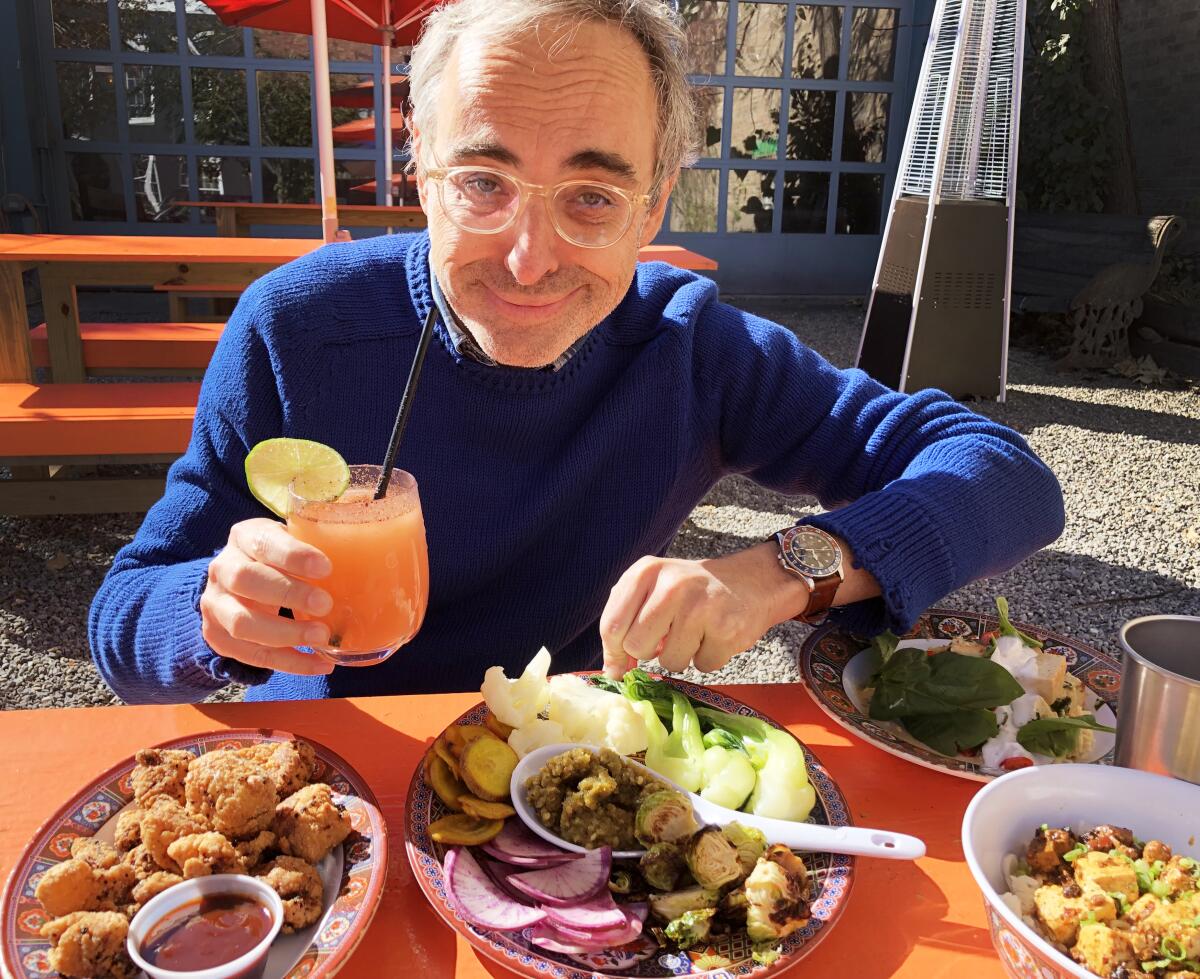
On the Shelf
Our Country Friends
By Gary Shteyngart
Random House: 336 pages, $28
If you buy books linked on our site, The Times may earn a commission from Bookshop.org, whose fees support independent bookstores.
The fall leaves were turning, the sweater weather brisk, and I was waiting for Gary Shteyngart in front of a popular restaurant in Hudson, N.Y., to talk about his new book, ‚ÄúOur Country Friends.‚ÄĚ The novel features a Shteyngart-esque writer, Sasha Senderovsky, his family and friends, a famous Actor, a Hudson Valley compound and, last but not least, the pandemic.
Shteyngart had described himself over email so I could spot him: ‚Äúsmall, furry and have a confused expression on my face most times.‚ÄĚ Facing away from me, wandering around a vintage clothing rack, was a short man with a halo of chaotic gray hair. As I started toward him, the real Shteyngart came up from the opposite direction. Trim, well-groomed, sharply dressed and wearing the kind of watch that watch people apparently notice, here was Shteyngart the author. The man who had manifested as Senderovsky wandered off.
And yet Shteyngart says Senderovsky is his fictional avatar. Senderovsky lives in a home much like Shteyngart‚Äôs in the Hudson Valley; they both have a sheep farm nearby, a few right-wing neighbors and a groundhog called Steve. They‚Äôre both married with a school-age child. But Senderovsky‚Äôs career is in trouble, unlike Shteyngart‚Äôs. The real author‚Äôs bestselling books include the novels ‚ÄúAbsurdistan‚ÄĚ and ‚ÄúSuper Sad True Love Story‚ÄĚ and the memoir ‚ÄúLittle Failure.‚ÄĚ Funny, melancholy and often socially prescient, they are acclaimed for viewing the American condition through a lens that‚Äôs uniquely askew.
‚ÄúNobody reads Senderovsky anymore. He‚Äôs kind of a done deal,‚ÄĚ Shteyngart said. ‚ÄúMaybe one day I‚Äôll be too. Maybe this will be the time, maybe this is the end.‚ÄĚ At our outdoor table, he was speaking in a rush, jokes and serious ideas jostling one another. He took a sip of his cocktail ‚ÄĒ we‚Äôd ordered cocktails with lunch, in the spirit of the book‚Äôs boozy retreat.
‚ÄúI love people who are still trying to negotiate any kind of relevancy for themselves,‚ÄĚ he continued. ‚ÄúWriters, like ballerinas and artists, have to have an expiration date. Then it‚Äôs somebody else‚Äôs turn. Unlike Senderovsky, I have a nice tenured job at Columbia, so I‚Äôll never be on the street. Which is the ultimate immigrant thing.‚ÄĚ
Russian-born American writer Gary Shteyngart delivers the memoir ‚ÄėLittle Failure,‚Äô in which a would-be maudlin childhood becomes an ecstatic depiction of survival, guilt and perseverance.
As his biography still notes, Shteyngart was born in Leningrad in 1972. He grew up in Queens in a community of immigrants; the characters in the book come from South Korea, Russia and India. Decades later, their friendships aren’t about where they came from but their shared American history. As they recount their sometimes conflicting memories of roommates, an unfulfilled crush, ups and downs and that one unforgettable party, the past bleeds into the present.
Shteyngart, who is eager to point to real-life inspirations for his fiction, advisably brushed off questions about these characters. Each is based on several people, he said, although I’m not entirely sure I believe him.
At midlife, one is recently a tech millionaire, another a jet-setter with inherited wealth; Senderovsky has been a success but faces failure. The last of the dear friends is a failed adjunct professor working at his uncle’s restaurant.
‚ÄúI think all the other immigrants feel very guilty about what happened to him and think, is it patronizing to want to help him? What can we do for him? He‚Äôs the cross that they all bear,‚ÄĚ Shteyngart said. ‚ÄúSo many immigrants aren‚Äôt successful. We hear only about the Sergey Brins.‚ÄĚ
Senderovsky‚Äôs friends are all invited in the spring of 2020 to wait out the pandemic at his home in the country. He‚Äôs also invited a former student starting a slightly troll-y career, as well as the handsome, famous (unnamed) Actor, who‚Äôs attached to the TV deal Senderovsky desperately needs to happen. (In case you‚Äôre inclined to confuse this aspect of Senderovsky with Shteyngart, the real author consults for ‚ÄúSuccession‚ÄĚ and has projects in development ‚ÄĒ and the Actor is too old to be based on his former student James Franco.)
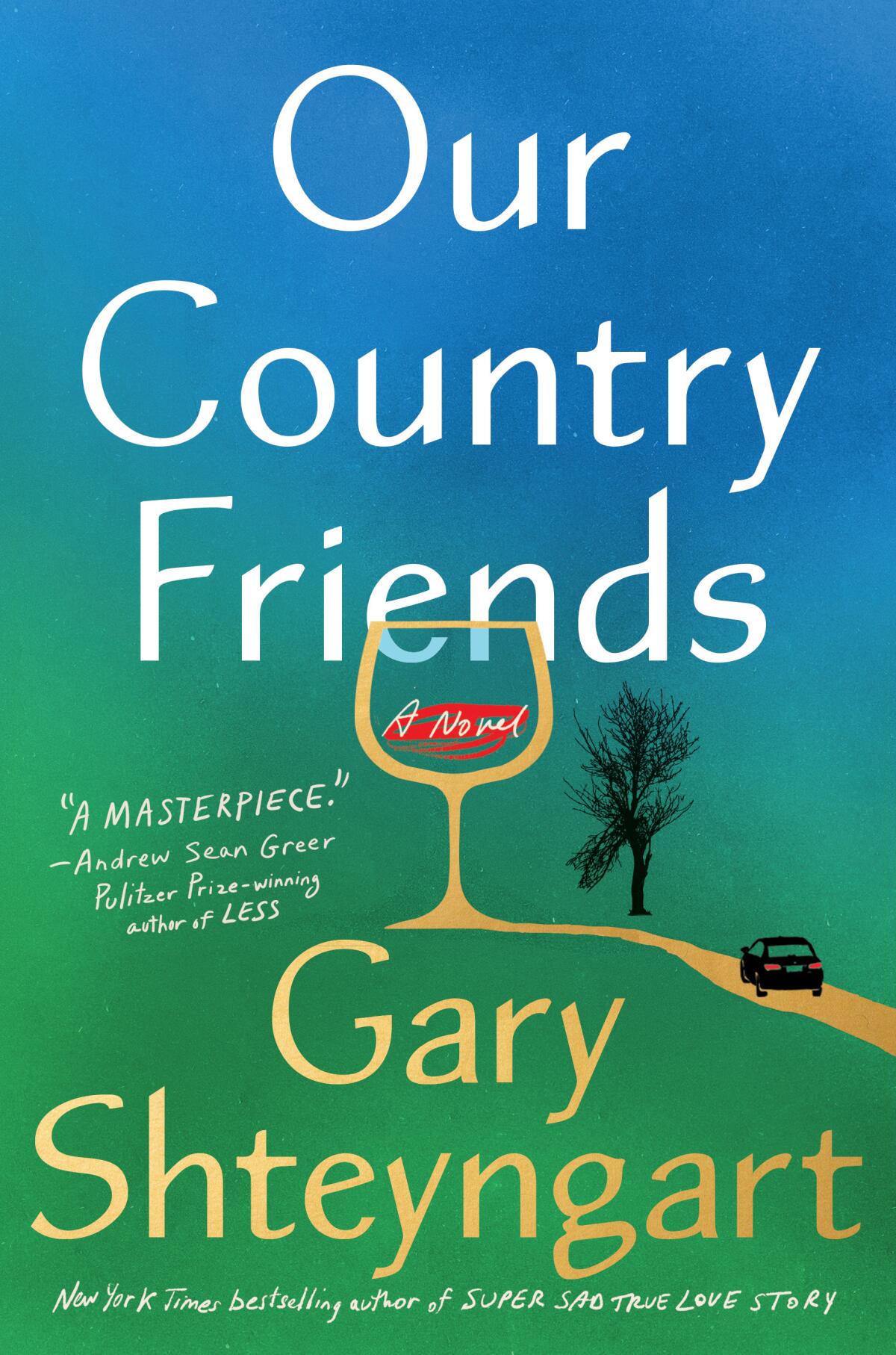
‚ÄúOur Country Friends‚ÄĚ has all his usual humor and absurdity, but it‚Äôs deepened by a new empathy. Seeing things from different characters‚Äô points of view helps; Shteyngart toggles among them smoothly and rapidly, sometimes in a single paragraph. In addition to the lifelong friendships, there are sexy and awkward liaisons, blossoming love, secrets and betrayals. ‚ÄúThe main thing I was reading when I was writing was Chekhov,‚ÄĚ Shteyngart said. ‚ÄúEveryone‚Äôs in the countryside and voicing regrets about what happened, and they‚Äôre all in their middle age, if not older. They‚Äôre like, ‚ÄėI wanted this, but I became that.‚Äô‚ÄĚ
Braced by the cocktail, I asked Shteyngart a question I‚Äôve never asked an author before: ‚ÄúSo ‚Ķ how‚Äôs your penis?‚ÄĚ
In a recent issue of the New Yorker, Shteyngart wrote about the ordeal of having a botched circumcision at age 7 after his family moved to America. The ‚Äúcovenant of pain‚ÄĚ culminated belatedly, during the pandemic year of 2020, in a cascade of crises he describes in the essay in excruciating detail.
‚ÄúThank you for bringing it up,‚ÄĚ he said. ‚ÄúIt‚Äôs interesting. Some interviewers are interested, and others are studiously avoiding the question. There‚Äôs no pain anymore. There‚Äôs just a discomfort. It sends signals every once in a while. It says, ‚ÄėHi, you‚Äôre Jewish.‚Äô‚ÄĚ
If anyone can teach you writing, maybe George Saunders can?
I‚Äôm fascinated by his generation of Russian-Jewish-American writers. I tell him I remember seeing banners in Los Angeles in the 1980s imploring us to ‚ÄúSave Soviet Jewry‚ÄĚ by helping his people immigrate.
‚ÄúIt was really nice for them to do that. On the other hand, the month after I came here, I had a part of my penis cut off,‚ÄĚ Shteyngart said. ‚ÄúGetting me out of the Soviet Union was nice; the genital mutilation, not so nice.‚ÄĚ
I laughed. ‚ÄúYou‚Äôre making me laugh at your pain,‚ÄĚ I said. ‚ÄúI‚Äôm sorry.‚ÄĚ
‚ÄúThat‚Äôs all I do as a writer,‚ÄĚ he replied.
He was undergoing terrifyingly painful treatments when working on ‚ÄúOur Country Friends,‚ÄĚ with a side of hallucinations. These made their way into the text: In addition to typical Shteyngartian scenes, like an unsexy hookup at an abandoned children‚Äôs camp, there are some surreal visions and nightmares. There is darkness in this story ‚ÄĒ which is, on the whole, a happy, sylvan version of the pandemic.
‚ÄúBeing here was a privilege, an absolute privilege,‚ÄĚ said Shteyngart, who usually spends most of his time in New York City. ‚ÄúThe guilt that all the characters feel comes from a very personal place. I grew up in Queens, where all of the horror was happening.‚ÄĚ For a time, New York City‚Äôs most diverse borough was also the nation‚Äôs epicenter of COVID-19 fatalities. ‚ÄúThat‚Äôs where all the characters are from. That‚Äôs where half of my best friends are from.‚ÄĚ
The contrast in the novel between Queens and what he‚Äôs called his ‚Äúdacha‚ÄĚ was no accident. ‚ÄúIt‚Äôs class. It‚Äôs ethnicity and race. All of these things obviously play a role in who gets to survive a pandemic in America.‚ÄĚ
Neither is the Hudson Valley a never-ending idyll. Throughout our lunch, our table was plagued by yellow jackets. They came for the fruity cocktails, stayed for the mapo tofu and the fried chicken. Shteyngart put down a plate and accidentally murdered one. Another drowned in a water glass. When we left, the waitstaff told us they hoped the yellow jackets would go with us, because they hadn’t been bothering any other tables.
It felt a little accusatory, as though the neurotic author and critic had manifested the wasps. It was surreal and improbable and a little bit absurd ‚ÄĒ a moment worthy of Gary Shteyngart.
Coming in November: Sam Quinones, Ann Patchett, Emily Ratajkowski, Nikole Hannah-Jones, Gary Shteyngart, Natashia De√≥n ‚ÄĒ and the list goes on.
Kellogg is a former book editor of The Times. She can be found on Twitter @paperhaus.
More to Read
Sign up for our Book Club newsletter
Get the latest news, events and more from the Los Angeles Times Book Club, and help us get L.A. reading and talking.
You may occasionally receive promotional content from the Los Angeles Times.
